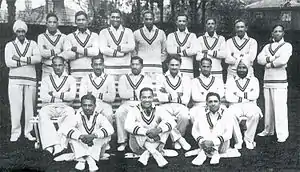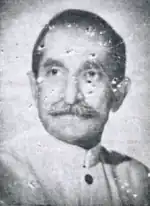Natwarsinhji Bhavsinhji | |||||||||||||||
|---|---|---|---|---|---|---|---|---|---|---|---|---|---|---|---|
 Natwarsinhji Bhavsinhji in 1932 | |||||||||||||||
| Maharaja Rana of Porbandar | |||||||||||||||
| Reign | 10 December 1908 - 15 February 1948 | ||||||||||||||
| Predecessor | Bhavsinhji Madhavsinhji | ||||||||||||||
| Successor | Monarchy Abolished | ||||||||||||||
| Born | 30 June 1901 Porbandar, Porbandar State, British India | ||||||||||||||
| Died | 4 October 1979 (aged 78) Porbandar, Gujarat, India | ||||||||||||||
| Issue | Udaybhansinhji Natwarsinhji Jethwa (adoptive) | ||||||||||||||
| Cricket information | |||||||||||||||
| Batting | Right-handed | ||||||||||||||
| Career statistics | |||||||||||||||
| |||||||||||||||
Source: ESPNcricinfo, 26 March 2019 | |||||||||||||||
Lieutenant-Colonel Maharaja Rana Shri Sir Natwarsinhji Bhavsinhji Sahib Bahadur, KCSI (30 June 1901 – 4 October 1979) was the last Maharaja of Porbandar belonging to Jethwa dynasty, who ascended the throne of princely state of Porbandar on 10 December 1908 and ruled until his state was merged into India on 15 February 1948.[1]
Biography
He was the only son of Maharaja Rana Shri Bhavsinhji Madhavsinhji Sahib Bahadur, Rana Sahib of Porbandar, by his third wife, Maharani Bama Sahib Ramba Kunverba Sahiba of Bhavnagar State.[1]
He was educated at the Rajkumar College at Rajkot and stood first in the diploma examination for all the Princes' colleges in India. He succeeded his father on his death on 10 December 1908 and ascended the throne on 26 January 1920 after he came of age.[1]
He married twice, but had no children. He first married Rupaliba Sahiba (1898–1943) of Limbdi State in 1920 and, after her death, Anant Kunverba alias Annette de Silva (1911–1989) in 1954.[1]


He captained India in his first Indian cricket team in England in 1932. He played in only four of the 26 first-class matches. In the era when only Royals used to hold position of Captains, in a rare gesture of sportsmanship, he stood down from the captaincy in favour of the more talented C.K. Nayudu[2][3] for the Test against England.[2] K. S. Ghanshyamsinhji, the elder brother of Rupaliba Sahiba, served as his vice captain.[4][5]
Natwarsinhji was an avid painter, author and musician; his literary works include "From the Flow of Life" (1967), "India's Problems: Reflections of an Ex-Ruler" (1970) and "International Solidarity" (1975). He was the joint composer with AW Hansen, of Great Britain of the "Oriental Moon Waltz" in 1930.[6]
He gave land to Nanji Kalidas Mehta, to start Maharana Mills manufacturing textiles.[7] After independence of India, he merged his state into the United State of Kathiawar on 15 February 1948. He also took active interest along with Nanji Kalidas Mehta to see that Kirti Mandir is being built in Porbandar, as a memorial to Mahatma Gandhi.[8]
Maharaja Sir Natwarsinhji Jethwa of Porbandar died in 1979 after a 71-year reign, aged 78. Although he had adopted a son, Rajkumar Udaibhansinhji Jethwa, in 1941, he died in 1977 with no issue; therefore, the headship of the dynasty is still uncertain after decades.[2]
Titles
- 1901–1908: Patvi Namdar Maharajkumar Shri Natwarsinhji Bhavsinhji Sahib
- 1908–1918: His Highness Maharaja Rana Shri Natwarsinhji Bhavsinhji Sahib Bahadur, Rana Sahib of Porbandar
- 1918–1929: His Highness Maharaja Rana Shri Natwarsinhji Bhavsinhji Sahib Bahadur, Maharaja Rana Sahib of Porbandar
- 1929–1941: His Highness Maharaja Rana Shri Sir Natwarsinhji Bhavsinhji Sahib Bahadur, Maharaja Rana Sahib of Porbandar, KCSI
- 1941–1945: Captain His Highness Maharaja Rana Shri Sir Natwarsinhji Bhavsinhji Sahib Bahadur, Maharaja Rana Sahib of Porbandar, KCSI
- 1945–1946: Major His Highness Maharaja Rana Shri Sir Natwarsinhji Bhavsinhji Sahib Bahadur, Maharaja Rana Sahib of Porbandar, KCSI
- 1946–1971: Lieutenant-Colonel His Highness Maharaja Rana Shri Sir Natwarsinhji Bhavsinhji Sahib Bahadur, Maharaja Rana Sahib of Porbandar, KCSI
Honours
- Delhi Durbar Gold Medal – 1911
- Knight Commander of the Order of the Star of India (KCSI) – 1929
- King George V Silver Jubilee Medal – 1935
- King George VI Coronation Medal – 1937
- Indian Independence Medal – 1947
References
- 1 2 3 4 Indian Princely States : Genealogy of the rulers of Porbandar. uq.net.au
- 1 2 3 Kutch Gurjar Kshatriyas : A brief history & glory: Section: History of Rajput Surnames, their origin and myths : sub-section : History of Jethwas : by Raja Pawan Jethwa (2007). pp 81–82.
- ↑ "Royalty on the cricket field". International Cricket Council. Retrieved 18 May 2018.
- ↑ Maharaja of Porbandar. CricketArchive
- ↑ Obituary in Indian Cricket 1980
- ↑ Catalog of copyright entries: Musical compositions, Part 3. Library of Congress. Copyright Office. 1932. p. 516.
- ↑ Fernando Franco, Jyotsna Macwan, Suguna Ramanathan (2004). Journeys to freedom: Dalit narratives. Popular Prakashan. p. 210. ISBN 8185604657.
The Maharana Mills was opened by Nanji Kalidas. His Highness gave him the land at one rupee per square yard. The aim was to lead the city and its subjects to prosperity
{{cite book}}: CS1 maint: multiple names: authors list (link) - ↑ At the time when Gandhiji was released for the last time from the Agakhan palace by the British Government, residential public of Porbandar had decided to construct an ideal memorial on the birth palace of Mahatmaji. At that time, organization of the project was accomplished by the intensive efforts of the late Maharaja of Porbandar, Shri Natavarsinhji, and Rajaratna Shri Manjibhai Kalidas Mehta and his wife, Smt. Santokbehn. Archived 3 January 2015 at the Wayback Machine
External links
- Natwarsinhji Bhavsinhji at ESPNcricinfo
 Media related to Natwarsinhji Bhavsinhji at Wikimedia Commons
Media related to Natwarsinhji Bhavsinhji at Wikimedia Commons